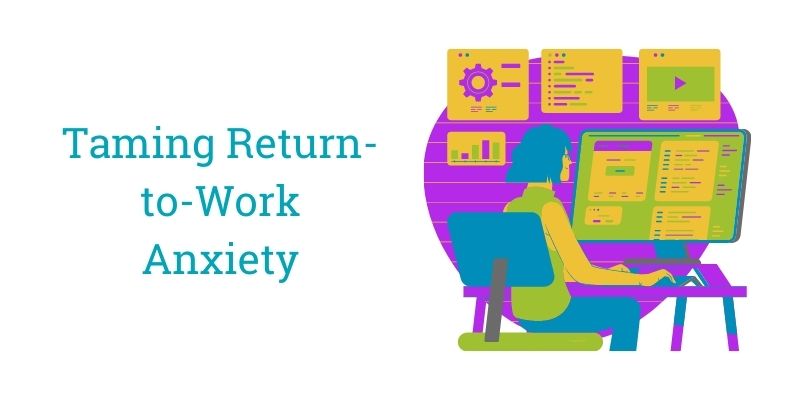
6 Tips for Dealing with Return-to-Work Anxiety
5 Tips for Facing Your Return-to-Work Anxiety
These tips can help you manage your anxiety.
1. Feel your feelings about return-to-work anxiety
Acknowledging your feelings is the first step in facing your return-to-work anxiety. It’s normal and to be expected to feel a little anxious about any big changes like this. Remember that feeling some anxiety about big changes is normal. There are many tips for working through these feelings. You might find that journaling is helpful and talking with your therapist can help you manage these thoughts and feelings.
2. Plan ahead and reawaken old habits
While you can’t control everything regarding your return to work, there are some things you can plan. Planning what you can gives you a sense of control. For example, you may need to plan your lunches (brown bag lunches or meal prepped boxes, etc.) instead of eating at home.
Lay out your outfits or items you need for the next day, so your mornings are calmer and less rushed.
3. Find the silver linings
Although there is a lot of change happening right now, try to find the silver linings. Take a minute to reflect on your favorite parts of working at the office. Did you enjoy coffee breaks with a co-worker? Maybe you enjoyed your lunch time walks around the campus? Focus on anything that sparks joy. Remembering your favorite parts of your day at the office can help make your transition easier.
In addition to remembering your favorite elements of working in an office, make new traditions to tame return-to-work anxiety. Even little things, like buying a new lunch bag or making new habits (like listening to a fun podcast on the way to work) can help make your transition easier.
4. Be compassionate with yourself and others
Set realistic goals and expectations. It’s okay to not love returning to work right away. Be compassionate and easy on yourself as you go through this transition. Likewise, be compassionate with others who may also be experiencing similar feelings as you.
Believe in yourself. Develop your skill of self-confidence which can help ease anxieties.
“The secret to self-confidence is repetition, repetition, repetition.”
5. Practice mindfulness
6. Ask for help
Even with your best efforts, you might still need help managing your social anxiety, and that’s ok. Social anxiety, like all anxiety disorders, can be managed. If you are looking for a trusted and experienced mental health doctor or therapist, contact us today to get started exploring your multidisciplinary social anxiety treatment options.
Related Posts
What Is the MTHFR Gene Mutation? And How Does It Affect You?
In recent years, the MTHFR gene has garnered attention for its role in various...
What Is the Difference Between Psychiatrists and Psychologists?
If you have mental health concerns — whether that's anxiety, depression, or...



